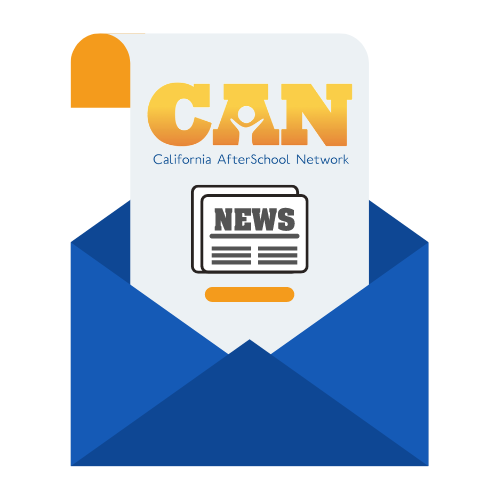Equity Evolution: CAN’s Growth Story
Vol. 12
A Punk Rock-Shaped Lens on Positive Youth Development – My Equity Journey
By: Jeff Davis
In 2015 I wrote a blog for the BOOST Café about the importance of positive youth development, and specifically about the importance of opportunities for meaningful participation as an important protective factor for me because as I highlight in the blog,
“In adolescence, I disengaged from my education. While I had no problem making grades, I did not perceive relevance in my education. My peers and I considered ourselves socially conscious, but we did not have a positive outlet to put our energy into. Luckily… I continued on to higher education. This is when it all changed. I pursued my own interests and became enthusiastic about learning. I participated in extracurricular activities including my first youth work experiences. I found my calling.”
A “Peace Punk” Playlist
- Petroleum Distillation, Fifteen (1992)
- Situation, Crimpshrine (1989)
- Unity, Operation Ivy (1989)
- Vulnerability, Operation Ivy (1989)
- Subdivision, Fifteen (1991)
- I Am A Man, Fifteen (1999)
- Stolen Life, Fifteen (1999)
- Family Values, Fifteen (1999)
- Easy Answers, Crimpshrine (1989)
- And We Though Nation States Were a Bad Idea, Propagandhi (1996)
- Inspiration, Crimpshrine (1989)
I was privileged and lucky to find a calling that meant something to me. But like many children and youth today (according to the California Healthy Kids Survey), I lacked meaningful participation, in and out of school. But how did I come to perceive a lack of meaning in my formal learning environments? And when I was not engaging in learning at school, what was I learning? Where was I engaging?
Around the age of 16, I began devouring the lyrics of bay area punk rock bands such as Crimpshrine, Fifteen, Operation Ivy, and a Canadian punk rock band called Propagandhi. The ideas contained in their lyrics shaped my worldview at a pivotal time in my development. As my friends and I identified more with the ideas expressed by this genre we found ourselves moving further away from the conventional norm. We found corners on the outskirts of town or in nature to make meaning of the world around us and contemplate our place in it. As one of our favorite songs expressed, “I Found a few friends who feel the same way. We were outcasts in their world so we’re building our own world today” (Crimpshrine, 1989).
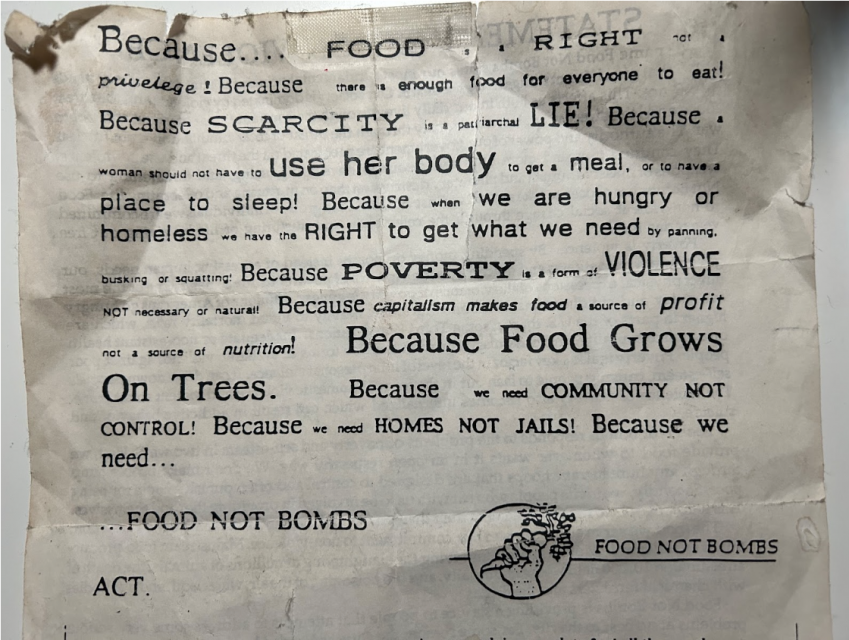 The music I engaged with provided
an opportunity for me to consider the design, and
re-design of our society. A critical idea surfaced
through the music and the “scene” was (inspired by the
organization) “Food Not Bombs.” Food not Bombs means exactly what
it sounds like. It puts forward the question, “ What if we took
all the money we spent on war globally, and applied it to
humanitarian causes like feeding people?” Imagine how different
the world would be. I began to align my ideals with a “food not
bombs” mentality. To this day a flier I found in the bay area in
the 1990s is still up in my house that describes the mentality I
began to internalize.
The music I engaged with provided
an opportunity for me to consider the design, and
re-design of our society. A critical idea surfaced
through the music and the “scene” was (inspired by the
organization) “Food Not Bombs.” Food not Bombs means exactly what
it sounds like. It puts forward the question, “ What if we took
all the money we spent on war globally, and applied it to
humanitarian causes like feeding people?” Imagine how different
the world would be. I began to align my ideals with a “food not
bombs” mentality. To this day a flier I found in the bay area in
the 1990s is still up in my house that describes the mentality I
began to internalize.
The “scene” provided a critique of the status quo and the dream of a different world, one centered on human beings and the earth that supports them. Songs like Fifteen’s Petroleum Distillation critiqued a capitalist economy fueled by the combustion engine and land ownership, causing a depleted environment while many run on wage treadmills one paycheck away from homelessness. These kinds of ideas gave me the permission to dream about the world I would create if I could be involved in redesigning it.
The songs pointed to the flawed parts of our systems, like
that we need more justice in our justice
systems. Stolen Life (Fifteen, 1999) spoke of
unnecessary, unjust, and racist murders at the hands of north bay
police in the 1990s. While these kinds of concepts have
long been part of my awareness, they have not necessarily been
part of my lived reality. Police brutality and systemic
racism is now front and center in the broader social ethos. As
consciousness has risen on this issue it is impacting me in new
ways. I have come to hear my peers of color differently as they
share their fears for their children every time they leave the
house. In the past, my inner dialogue might have sounded
something like, “I can’t imagine that.” I am now finding that it
is necessary for me to imagine that reality. Because when I
imagine it being the reality of my children it becomes so
completely unbearable it is beyond belief. So much so, that I
cannot believe that we live in a world where this is a reality
for anyone. This injustice causes so much stress on humans, on
families, and on communities. This injustice is unsustainable.
This injustice cannot stand.
The scene also informed me how I can move as a man with integrity in the face of the dominant culture. Not surprisingly (it is punk rock after all) the music invited me to question the not-so-subtle paradigm of manhood in our culture in ways that center our humanity. The music proposed a different model (Fifteen, 1999)
A man should be mentally, physically, spiritually, and
emotionally available
To his partner, his children, his community
To the other children in his community
A man should abandon power over
A man should embrace the notion of the power of
I’m a man, at least I think I am
When I became a youth worker I was so enlivened to live my passion, to make my activism my career, to work each and every day on behalf of children and families. To be mentally, spiritually, and emotionally available to humanity. It was these ideas that led me to this work. To this very day, I get to live my passion, and this commitment to being a man with integrity.
The bands I was listening to in adolescence were also foundational to my ideas about equality, equity, and justice. The songs invited me to question artificial divisions between people and instead consider that “every division is artificial” with no reason to fight anyone because, “we’re all the same mankind, we all possess the same life” (Fifteen, 1991). In this context the work to break down artificial divisions perpetuated in our society.
So come on down man, And take a look at who I am
Or are you afraid to find A part of yourself
Inside of someone you don’t understand?
I would think that to be the case
Cuz you got the same eyes And I got the same face
We got the same blood And we got the same flesh
So take you hate and give it a rest
(Crimpshrine, 1989)
This foundation created fertile ground as I have evolved personally from a centering in equality to a centering in equity. I continue to learn about the historical roots of racism and how the foundations of our society are built on structural oppression. These notions have led me to understand that it is not enough to promote equality. It is not enough to behave in ways that are “not racist.” We have to work actively to address the contexts and conditions that have perpetuated inequities. We must do the work to be proactively anti-racist.
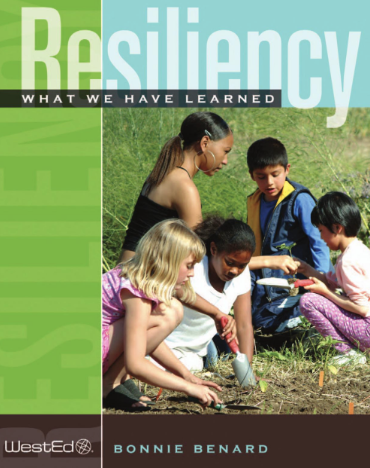 When I started at the
California AfterSchool Network in 2007, I was training
on the WestED
developmental framework of resiliency and positive youth
development. This research-based model discusses how the
conditions we create (protective factors) in families, schools,
OST programs, and communities meet developmental needs, and
foster the development of strengths that result in positive
developmental outcomes for children and youth. When I discovered
this framework it called to me. Mostly because it was
research-based, and highlighted the importance of caring
relationships, and meaning, something that I was so lacking in my
adolescent years. This is when I began to develop my punk
rock lens of youth development. This lens continued to
find its focus. I began to find notions of positive youth
development (amazing, but) incomplete. I was deeply
impacted when I heard a colleague say something to the effect of,
“Is it good enough that you create a loving environment for my
child in an OST program, when after I pick up my kid from the
program if I get pulled over I’m at risk of being killed by the
police?” I started to widen my lens of the conditions for
thriving that we must create for whole children, families, and
communities.
When I started at the
California AfterSchool Network in 2007, I was training
on the WestED
developmental framework of resiliency and positive youth
development. This research-based model discusses how the
conditions we create (protective factors) in families, schools,
OST programs, and communities meet developmental needs, and
foster the development of strengths that result in positive
developmental outcomes for children and youth. When I discovered
this framework it called to me. Mostly because it was
research-based, and highlighted the importance of caring
relationships, and meaning, something that I was so lacking in my
adolescent years. This is when I began to develop my punk
rock lens of youth development. This lens continued to
find its focus. I began to find notions of positive youth
development (amazing, but) incomplete. I was deeply
impacted when I heard a colleague say something to the effect of,
“Is it good enough that you create a loving environment for my
child in an OST program, when after I pick up my kid from the
program if I get pulled over I’m at risk of being killed by the
police?” I started to widen my lens of the conditions for
thriving that we must create for whole children, families, and
communities.
I discovered Shawn Ginwright’s concepts of Social Justice Youth
Development and
Healing Centered Engagement. These asset-based approaches
both acknowledge and address the need for protective factors, but
also how to focus on wellness in the face of community trauma.
Part of healing-centered engagement is about developing youth
agency for restorative and civic action to address issues at the
root of community-wide trauma. These notions have also evolved
into notions of
Robust Equity. Robust Equity strategies are paired with youth
development/healing-centered engagement practices as “the
intentional counter to inequality, institutionalized privilege
and prejudice, and systemic deficits and the intentional
promotion of thriving across multiple domains for those who
experience inequity and injustice.” These strategies are
implemented across domains to address systemic inequities. This
requires individuals and systems to work with a shared
understanding of the conditions necessary for youth to thrive and
a collaborative, systemic approach to create those
conditions. 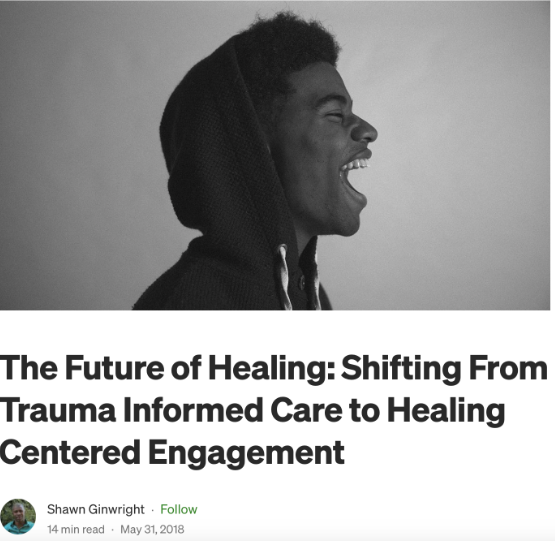
I have come to believe that it is no longer adequate to tinker around the edges of inequitable systems. It is important for us to take stock of the systems we have designed and the results they are creating. I often ponder the fact that we as human beings can create any world we want to and the world we have created is not good enough. Not for all of us. It is time for us to create systems grounded in compassion, that create the conditions for all humans, in every community, to thrive. This is the work.
I am coming to understand that advancing equity includes deep personal work. I experience a world that is extracting. I have recognized that our hierarchical structures do not nurture our humanity. I have heard my peers in states across the nation worn down by the need to code switch to promote safe and inclusive conditions that research has shown results in positive developmental outcomes. They code-switch because they will not have access to resources if they are targeted as advancing a “woke” political agenda. I have seen my peers of color express how tired they are having to code switch in white dominant spaces while simultaneously tokenized with the responsibility of “holding the equity conversation.” We’re all actively healing from the systems as they are currently designed.
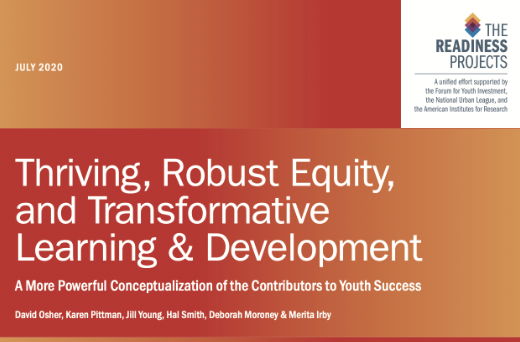 Therefore the work is about
a focus on our own personal mastery. Part of this is
continually reflecting on how our biases show up in our work, and
how we learn, evolve, and heal based on this reflection. This is
a process that is mutually vulnerable and authentic and must be
baked into our practice as part of the work. It is also about
visioning which we want to grow toward because learning and
healing are processes that we will never be “done” with. This has
informed our approach at CAN. We approach our work as humans
first, and we hold each other with grace and compassion. As new
members experience these conditions, I have seen them flourish
and actively heal from the traumas of the world of work.
We are now describing our work as anchored in an
aspiration for a global, human-centered society.
Therefore the work is about
a focus on our own personal mastery. Part of this is
continually reflecting on how our biases show up in our work, and
how we learn, evolve, and heal based on this reflection. This is
a process that is mutually vulnerable and authentic and must be
baked into our practice as part of the work. It is also about
visioning which we want to grow toward because learning and
healing are processes that we will never be “done” with. This has
informed our approach at CAN. We approach our work as humans
first, and we hold each other with grace and compassion. As new
members experience these conditions, I have seen them flourish
and actively heal from the traumas of the world of work.
We are now describing our work as anchored in an
aspiration for a global, human-centered society.
Through this evolution, I continually learn why it is important for me to leverage my privilege and positional authority to create better conditions for all. To “be a voice that challenges a history of white supremacy, racial injustice, patriarchy, hetero-normativity, capitalism, environmental injustice, and oppression that has resulted in inequitable outcomes for children, youth, families, and communities” (an excerpt from CAN’s commitment to equity and justice). Here again, my punk rock roots inform the importance of this perspective, “and (I) recognize the irony that the system I oppose affords me the luxury, of biting the hand that feeds. That’s exactly why privileged folks like me, should feel obliged to whine and kick and scream, yeah till everyone has everything they need!” (Propagandhi, 1997).
But to whine and kick and scream, my first job is to listen. As I listened to our Leadership Team and our field across sectors it became apparent that we cannot be neutral. As I listened, I began to reflect back on what I was hearing from the field about what was important to stand on. This reflection ultimately became CAN’s Commitment to Equity and Justice, which was unanimously adopted by the CAN Leadership Team. I think it is important to highlight that as a white, cis-gendered male leader of a primarily BIPOC-led and BIPOC-staffed organization, I was the primary author of this commitment. Advancing this commitment feels so meaningful to me. Advancing this purpose is the punk rock work my adolescent self craved. I get to imagine a more just and equitable world and work toward that goal every day.
Finally, my journey has all about been discovering and living a Network approach to social change. Here the punk rock lyrics of my adolescence are also a reflection of the network principle, “mission, not organization.” We can’t eat the elephant alone. We can only achieve what we want to achieve as part of a constellation moving that mission. It is not about individual stars. We can only do this together.
I have a dream today
That all the armies will walk away
Go home and celebrate
Love and life and laughter
I dream the end of win and lose, because
There’s no victory without cooperation.
(Fifteen, 1991)

